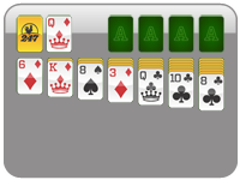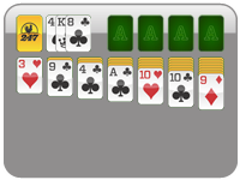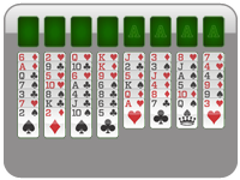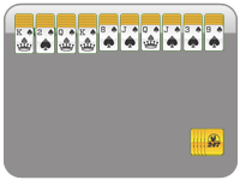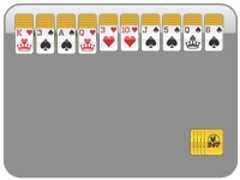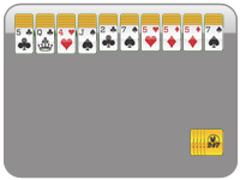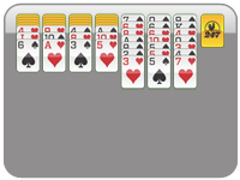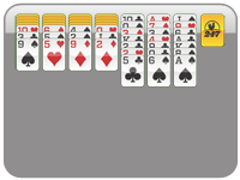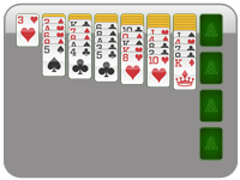How to Become Detail Oriented Using Card Games

Are you wondering how to become detail-oriented? You’ve come to the right place! Did you know that playing cards are a fantastic way to improve your cognitive skills, including detail orientation?
That’s right! Card games are a fantastic way to improve attention, problem-solving skills, and more. In this blog, we’ll review some of the key benefits of playing card games and where you can play them online for free.
What does it mean to be detail-oriented?

Being detail-oriented means paying close attention to small elements and getting things right the first time. It involves staying organized, catching errors, and noticing patterns others might miss. Detail-oriented people tend to follow steps carefully, double-check their work, and take pride in accuracy.
This skill appears in many tasks, like proofreading a document, completing a spreadsheet, or planning a trip. In each case, it’s not just about the big picture. It’s about being precise with information, spotting inconsistencies, and ensuring nothing gets overlooked.
Some describe it as being thorough. Others see it as the ability to focus on the task without rushing. No matter how defined, this thinking helps reduce mistakes and builds trust with others who rely on your work.
Why is being detail-oriented a skill worth developing?
Being detail oriented helps you stay accurate, focused, and consistent. In a work setting, this can lead to fewer mistakes, stronger performance, and better results. For example, detail-oriented employees often catch issues early, follow procedures correctly, and complete tasks without missing steps.
In daily life, this skill can support better time management and organization. People who pay attention to details tend to remember appointments and follow instructions more easily. It also plays a role in tasks like budgeting, meal planning, and running errands.
As people age, attention to detail can support mental sharpness. According to a study published in Frontiers in Psychology, structured games and social interaction can help improve executive control in older adults. This kind of brain engagement helps maintain memory, focus, and the ability to process information accurately.
The link between card games and focus
Card games demand focus. Games require players to look for patterns, recall past moves, and make decisions based on logic rather than impulse. This process strengthens how the brain handles tasks that involve organization, observation, and timing. These are the same skills used to stay detail-oriented in everyday life.
A research paper on cognitive skill development found that playing cards can help improve pattern recognition and generalization. These improvements support the thinking needed to notice small details and complete tasks more accurately.
Because card games are interactive and require steady mental effort, they help build habits that transfer into other areas—like catching errors in a document, staying focused during a meeting, or staying alert while doing something repetitive.
Want a fun way to practice? Play Solitaire for free online and challenge your focus every day.
How card games train you to be more detail-oriented

If you want to become more detail-oriented, research has shown that card games are a fantastic way to improve cognitive skills.
Card games create a low-pressure environment where focus matters. Each game requires a different kind of attention. Some games reward pattern recognition; others test your ability to recall specific details or stay alert through a series of moves. This mental workout can help reinforce the same skills used to keep focused and detail-oriented in everyday tasks.
The more time you spend playing card games, the more you train your brain to slow down and observe what’s in front of you.
Solitaire sharpens pattern recognition
Solitaire trains you to spot what fits and what doesn’t. Every move depends on recognizing sequences, colors, and suits. Over time, players learn to scan the board quickly, notice gaps, and track which cards have already been played. These are all pattern-based decisions that require steady concentration.
Solitaire also rewards players who play patiently and avoid rushing through the deck. That sense of control helps build habits that carry over into work and other tasks that require precision. Small differences, like a card's position or the suit's color, can make or break the game!
Play Solitaire for free online!
Bridge and poker train strategic focus
Bridge and Poker challenge you to think several steps ahead. In Bridge, success often comes from tracking which cards have been played and predicting how partners and opponents will act. In Poker, reading small behavioral cues and keeping track of betting patterns can give players an edge. These moments test your ability to stay alert and process subtle information without missing a beat.
Both games reward players who stay calm under pressure and stick to a plan. Those are the same qualities needed to stay detail-oriented during complex or high-stakes tasks at work or at home.
Memory card games build recall and concentration
Memory games are simple, but they demand full focus. To succeed, you must remember each card's position and track which pairs have been revealed. This process strengthens short-term memory and builds concentration, especially with distractions.
It’s simple: the more you play, the better your brain gets at storing and recalling specific information. Memory games also improve sustained attention. You’re not just remembering one card—you’re building a mental map of the entire board. This kind of active thinking encourages a slower, more deliberate pace, which can help train the brain to focus on details rather than rush through tasks.
Researchers studying the effects of gameplay on thinking skills found that card games support pattern recognition, strategy, and memory building. According to this study, games like Memory Match can help players improve how they identify and work with complex information.
Make card games a part of your brain-training routine!
Playing card games regularly is one of the easiest ways to build focus and sharpen your attention to detail. It doesn’t require expensive tools, long time commitments, or complicated setups. Just a few minutes a day of concentrated play can help improve how you observe, plan, and follow through.
If you’re ready to get started, 24/7 Solitaire offers a free and easy way to play online. You can track your gameplay stats, explore seasonal varieties, and enjoy a clean, intuitive interface built for every skill level.
Improving focus doesn’t have to feel like work. With card games like Solitaire, you can practice detail-oriented thinking while having fun at your own pace.
Solitaire Games
More Solitaire Games
More Games
Solitaire News
Disclaimer
DISCLAIMER: The games on this website are using PLAY (fake) money. No payouts will be awarded, there are no "winnings", as all games represented by 247 Games LLC are free to play. Play strictly for fun.

